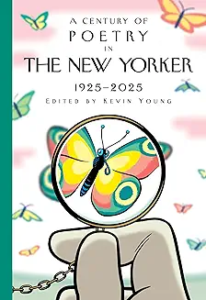A Century of Poetry in The New Yorker 1925-2025 ed. by Kevin Young 2025
This remarkable collection was edited by a young poet and writer and was published on the 100th anniversary of the founding of one of the world’s great periodicals, The New Yorker. The magazine was founded on February 1, 1925 by Harold Ross and his wife, Janet Grant, a reporter for The New York Times. They wanted to create a sophisticated humor magazine that would be different from “corny” humor publications, and while they succeeded in that goal, the magazine soon became the pre-eminent site for the publication of long journalism, short fiction, essays, poetry, and cartoons.
Kevin Young, the poetry editor of the magazine since 2017 has selected over 900 poems published in The New Yorker from its inception through the current year presenting them in two alternating sections, decades and times of day. Hence, the section on the 1920’s and ’30’s follows “Morning Bell” and precedes “Lunch Break”. Young was the Director of the Museum of African-American History in D.C. until his abrupt and arbitrary firing by the Trump administration and the 2023 recipient of the Harvard Arts Medal. At the editor, David Remnick’s request, he has undertaken the rather daunting task of selecting the 900 or so poems for this volume from the 13,500 or so poems published over the last 100 years. The Nobel Prize winners are there (Louise Gluck, Seamus Heaney, Joseph Brodsky, Czeslaw Milosz, Wislawa Szymborska, Tomas Transtromer) as is W. S. Merwin whose more than 200 poems appeared over six decades alongside poets whose names have largely vanished. Who is strikingly absent before the 1970’s are African-American, Asian, and Native American poets. Even Langston Hughes was not included in the New Yorker Book of Poems published in 1969.
Young approached his task with the observation that “Good poems make the everyday extraordinary and turn the extraordinary into a daily occurrence” and with the view that “poetry is not only present but prescient…Great poems remain both timely and timeless.” With that in mind, he begins the collection with Adam Zagajewski’s “Try to Praise the Mutilated World” written just before and published just after the 9/11 conflagration. Similarly, the final poem on page 959 is “The End of Poetry” by the 1922 U.S. Poet Laureate, the Mexican-American poet Ada Limon that was published at the height of the COVID pandemic. Between these startling works there are poems that are “humorous and serious, epic and short, visionary and tactile, formal and experimental, topical and tireless…engaging the world and inventing worlds that may or may not be more enjoyable to inhabit.”
This is not a book to read straight through, and to be clear, I have not yet made it past the 1920’s and ’30’s, but among those poems are some gems that fit into this month’s 1925 theme. Dorothy Parker, the humorist, wit, and all around clever member of the Algonquin Table is present with three poems as are Elinor Wylie, W.H. Auden, and James Thurber along with the now seemingly forgotten Alfred Kreymborg, Ted Robinson, Burke Boyce, and Joseph Moncure March all of whose poems dated from 1925-26. Several of these can be read in the Poetry Tree on the Charles link in the monthly update, but here’s just a small taste of Parker’s wit in her poem “Bohemia”: Authors and actors and artists and such/Never know nothing and never know much./Sculptors and singers and those of their kidney/Tell their affairs from Seattle to Sydney./Playwrights and poets and such horses’ necks/Start off from anywhere and end up at sex./Diarists, critics, and similar roe/Never say nothing, and never say no./People Who Do Things exceed my endurance;/God, for a man who solicits insurance!”



